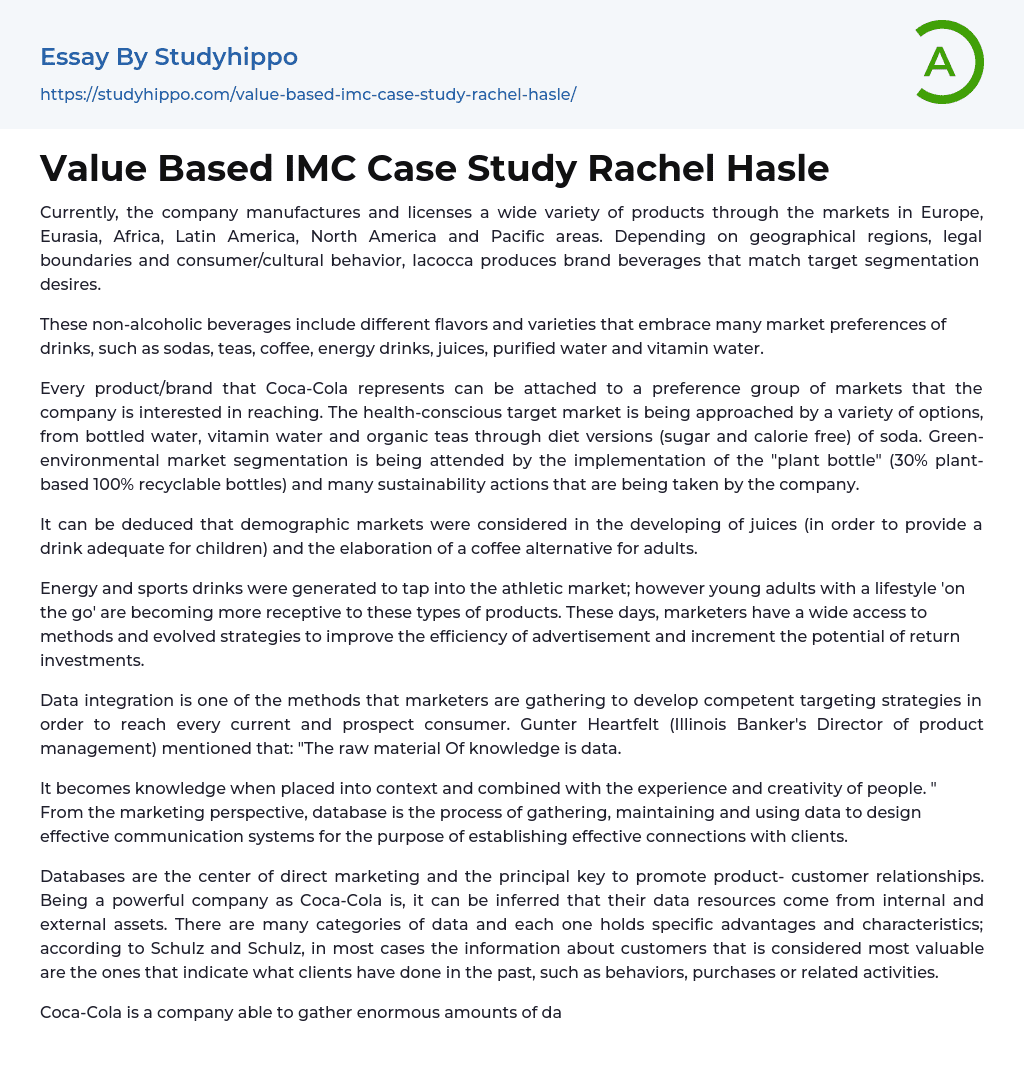Iacocca is a company that produces and licenses a variety of non-alcoholic beverages to suit different preferences in Europe, Eurasia, Africa, Latin America, North America, and Pacific regions. The beverages are designed to match the desires of target markets based on geographical regions, legal boundaries, and consumer/cultural behavior. These include sodas, teas, coffee, energy drinks, juices, purified water and vitamin water. Coca-Cola Corporation creates products/brands targeting specific preference groups within markets. Bottled water and diet soda options target health-conscious consumers while the "plant bottle" initiative targets environmentally conscious individuals. Demographic markets were considered in developing children's juices and adult coffee alternatives. Energy and sports drinks catered to athletes while young adults who live an active lifestyle also prefer these products. Marketers have many advanced strategies at their disposal such as data integration which helps develop efficien
...t targeting strategies for both current and potential consumers; this enhances the effectiveness of advertising by increasing return on investments.Gunter Heartfelt, Director of Product Management at Illinois Banker, believes that data is the foundation for knowledge and becomes valuable when contextualized with experience and creativity. Databases are utilized in marketing to gather, maintain and use data to create effective communication systems that foster strong relationships with clients. Coca-Cola has vast resources which allow them to collect significant amounts of data from both internal and external sources. To optimize their present and future projects, companies analyze which categories of data will aid them in developing knowledge. Data fusion involves combining multiple databases to identify common characteristics among consumers, creating strategies that appeal to multiple target segments. Schulz and Schulz note that customer information is especially beneficial as it reveals past behaviors
purchases, and related activities. Direct marketing primarily revolves around databases driven by promoting product-customer relationships.Hess Mike and Doe Peter from Nielsen media analytics define data fusion as integrating multiple survey databases at a respondent level to create a unified source of information. Coca-Cola has implemented an enterprise data warehousing system capable of displaying multinational retail information, such as customer behavior, purchase history, satisfaction levels, and segmentation statistics. Through "master data management," this information is standardized to inform marketing decisions and respond quickly to market changes. Additionally, Coca-Cola collects geographic information to improve products, minimize manufacturing costs, and increase revenue. To ensure consistent taste in their Minute Maid orange juice product sold year-round despite the three-month peak growing season for oranges, Coca-Cola uses the "Black Book" model which gathers various data sources like satellite imagery, weather updates, crop yields, regional preferences including detailed data about 600 different flavors that make up an orange among other variables. In marketing decisions too e-commerce data from social media platforms like Facebook and Twitter with over 90 million followers on Facebook alone are used by Coca-Cola.By studying their potential audience's behavior and using tactical approaches, Coca-Cola gathers information about them. They rate various promotional plans based on different criteria evaluations and goals, such as creating the most remembered commercial during a Super Bowl. Surveys and organizations are responsible for rating this data.
To determine distribution locations and channels, Coca-Cola uses various types of data such as product purchase records, financial statements, budgets, and points of sales. For example, Walter generates four billion in annual sales of Coca-Cola products (Big Data-Startups website). As a global enterprise and one of the main beverage
industry adders, Coca-Cola's success is comprehensible due to precise marketing decisions that rely on deep technological analysis of meaningful data.
According to Anthony J. Van deer Hook from The Coca Cola Company's Global Customer and Commercial Leadership department, data analysis has become key to effective marketing strategies. He believes that it ensures the right products are in the right stores at the right time to meet consumers' daily and seasonal consumption needs (Attracted).
- Advertising essays
- Audience Theory essays
- Competitor Analysis essays
- Consumer essays
- Marketing Management essays
- Marketing Mix essays
- Marketing Plan essays
- Marketing Research essays
- Marketing Strategy essays
- Point Of Sale essays
- Price essays
- Procurement essays
- Product essays
- Product Differentiation essays
- Promotion essays
- Promotion And Marketing Communications essays
- Retailing essays
- Trademark essays
- Anheuser-busch essays
- Brands essays
- Detergent essays
- Product Placement essays
- Research Design essays
- New Product Development essays
- Advertisement essays
- Brand essays
- Sales Promotion essays
- Advertising campaign essays
- Consumer behaviour essays
- Offer And Acceptance essays
- Wal-Mart essays
- Discover essays
- Beef essays
- Beer essays
- Beverages essays
- Bread essays
- Burger essays
- Cake essays
- Coconut essays
- Coffee essays
- Cooking essays
- Crowd essays
- Cuisines essays
- Dairy essays
- Desserts essays
- Dinner essays
- Drink essays
- Fast Food essays
- Favorite Food essays
- Food Safety essays




